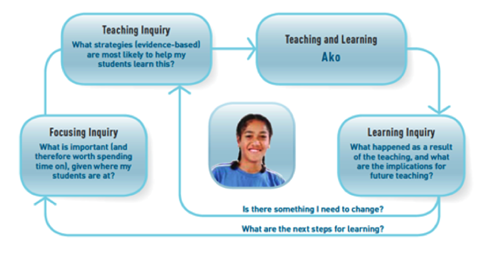Teaching as inquiry
Effective pedagogy requires that teachers inquire into the impact of their teaching on their students.
The New Zealand Curriculum, page 35
The inquiry process is a cycle in which teachers define what they want their students to learn (through a focusing inquiry), work out how best to teach it (through the teaching inquiry), and then look at the result (through the learning inquiry).

Inquiry diagram
The focusing inquiry
The fundamental question of the focusing inquiry is:
- What is important (and therefore worth spending time on), given where my students are at?
The focusing inquiry establishes a baseline and a direction. The teacher uses all available information to determine what their students have already learned and what they need to learn next. For this inquiry to be meaningful, the teacher has to know the students.
Questions that teachers could ask themselves include:
- Who is in my class – what is their gender, what are their cultural backgrounds and first languages?
- What experiences, knowledge, skills, attitudes, and values do my students bring with them?
- Why have they chosen this subject?
- What do they want to know and learn?
- What interests do they have in and out of school?
- What roles and responsibilities do they have in and out of school?
- What aspirations do they have beyond school?
This information could be gained from:
-
NZQA: New Zealand NCEA Secondary School Statistics – data from previous years, including analysis of previous qualifications data
- observation of students in different classroom and practical activities
- what the students themselves say, including information gained during class discussions, co-construction of learning, and informal conversations
- student questionnaires and surveys.
Curriculum knowledge
Questions relating to the curriculum include:
- What is the department’s vision and philosophy for the learning area?
- How does it connect with the school’s vision and goals?
- How do the
big ideas in health education, physical education, and home economics help to define significant learning?
- What does a health education, physical education, or home economics graduate look like?
- What knowledge,
skills, and experiences do they need to have by the end of year 11, 12, and 13?
- What
achievement objectives, indicators, and curriculum levels are important for learning?
- What might students
need to know and be able to do for NCEA levels 1, 2, 3, and beyond?
- What links can be made to other subjects or learning areas?
- What relevant events or issues are happening locally, nationally, and internationally that could contribute to student interest?
- How will the environment influence decisions on what students might need to learn?
- What connections to the community will support learning?
- How will school systems and resources affect programme design?
Wider connections
Answers to these questions could be gained from discussions and sharing with teachers in other subjects and learning areas and by identifying local, national, and international events and possible contacts in the local community. Another source of information is the student voice – through surveys, anecdotal discussions, and so on.
Prioritise learning on the basis of:
- the learning objectives for health, physical education, and home economics
- the information gathered about students’ existing knowledge and skills
- what will support future learning
- what will support the students’ ability to contribute to their communities
- the concepts, big ideas, and academic vocabulary that need to be introduced or reinforced.
TOP
The teaching inquiry
The fundamental question of the teaching inquiry is:
- What strategies (evidenced-based) are most likely to help my students learn this?
At this stage departments will need to consider:
- how the identified learning will be developed into units of work
- the contexts that will be selected for learning
- how much time is available to teach across the year
- the strengths of individual teachers
- what facilities and equipment are available.
Teachers will need to:
- investigate and try innovative, evidence-based strategies that fit with effective pedagogical principles
- use contexts that will be relevant to the students and will help them discover and explore the big ideas in the learning area.
TOP
The learning inquiry
The fundamental question of the learning inquiry is:
- What happened as a result of the teaching and what are the implications for future teaching?
The effectiveness of the strategies will be determined by the learning that the students achieve.
Teachers can use formative assessment methods to monitor students’ progress and understanding, both during and after learning.
Learn more:
Students’ achievement is assessed against the specified outcomes (including unit assessments and NCEA results). Teachers will analyse this information to identify groups or individuals for whom the teaching strategies have not worked, and meet with them to identify and discuss the issues.
Using feedback
Teachers can also seek feedback on the effectiveness of their strategies from observation of their teaching practice. This includes interviewing the students to gather information about their understanding of the intended learning, the relevance of the learning to them and the effectiveness of the strategies being used by the teacher.
Encourage students to provide feedback on the teaching and their resulting learning. This could be an open in-class discussion, via anonymous responses (for example, on
SurveyMonkey), exit cards at end of a class, or part of a self-assessment and reflection process in the middle of a unit or at the end.
Establish the next steps for students’ learning – for example, the concepts that need to be reinforced or introduced next, different contexts through which the students can discover and explore the big ideas, and other strategies for meeting their learning needs.
Last updated February 14, 2024
TOP


